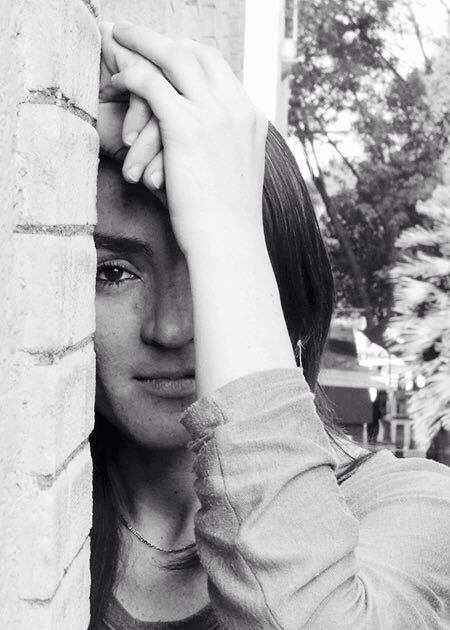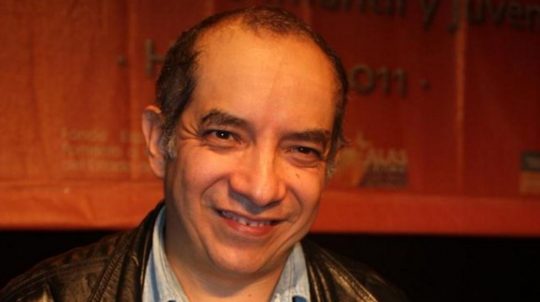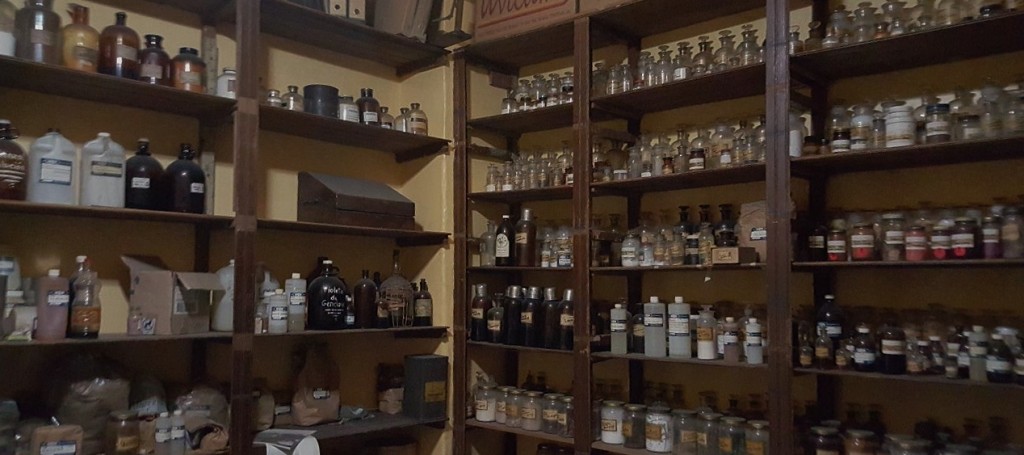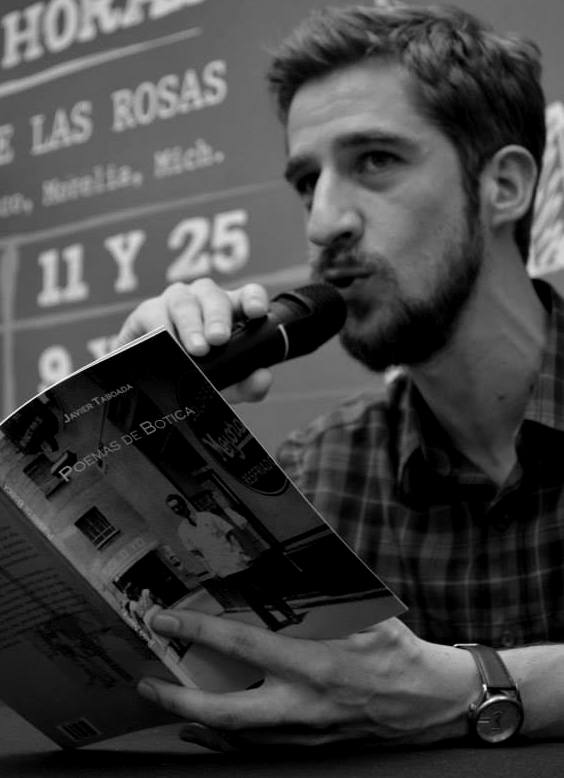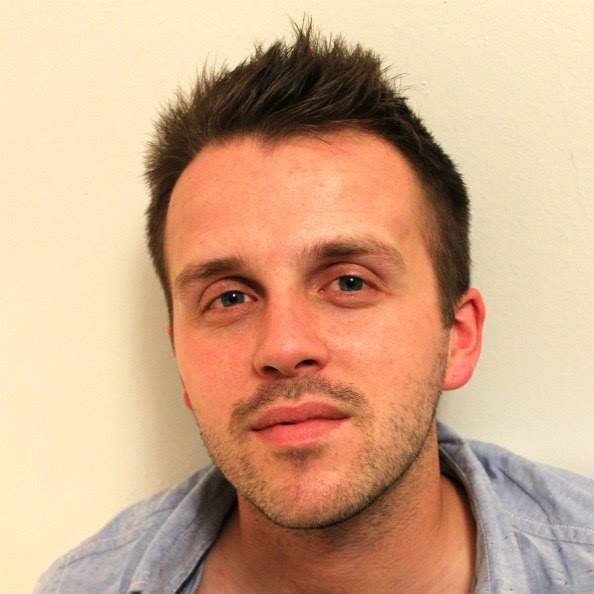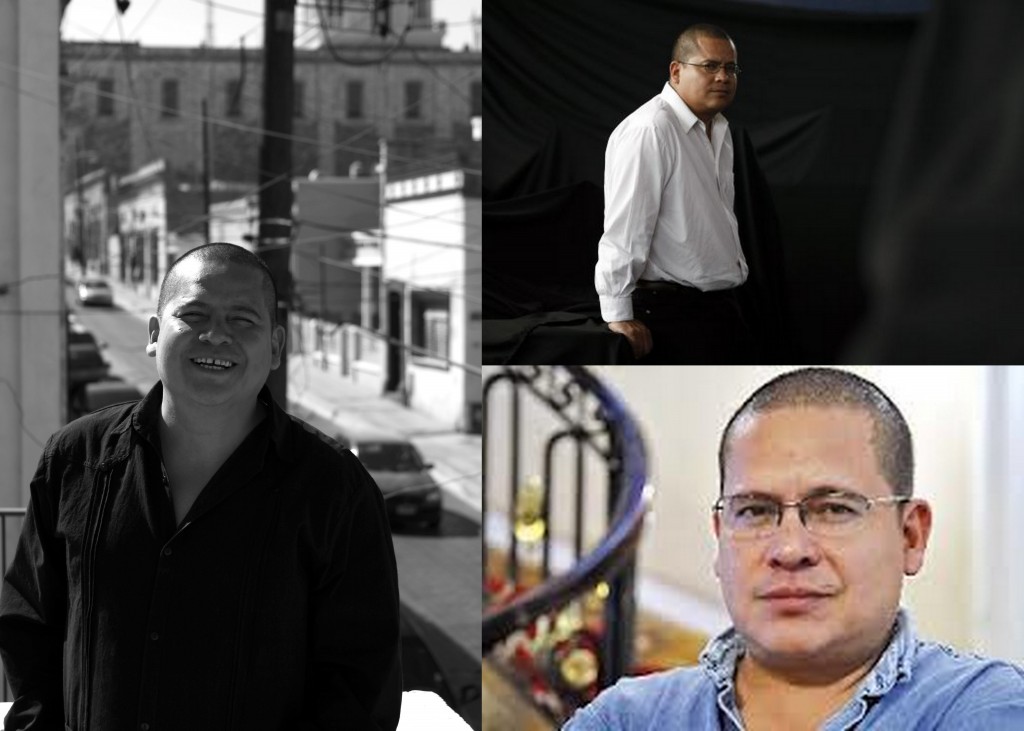.
When I first read Maria Rivera’s “Los muertos” (“The Dead”), translated from the Spanish here by Richard Gwyn, I was blown away. I just needed to share it with an international audience. Maria is a fearless poet and activist. It is a pleasure to feature her work in Numéro Cinq.
— Dylan Brennan
Poema leído al finalizar la marcha nacional por la paz el día 6 de abril de 2011,en apoyo al poeta Javier Sicilia y en exigencia de la paz. México D.F.
§
Dylan Brennan: Why did you write ‘Los muertos’ (The Dead) and how has it been received?
Maria Rivera: I wrote ‘Los muertos’ in the year 2010 (the year of the Mexican bicentennial celebrations). At that time Mexico found itself immersed in homicidal violence, produced, in part by the military anti drug-trafficking policy undertaken by president Calderón from the beginning of his six year term, an attempt to legitimise his presidency in the wake of electoral fraud. I found myself writing a book about the relationship between poetry and politics (from 2006), a long and ambitious poetic project which attempted to question the strata of the poetic tradition, speak about the different forms of violence, beginning with misogyny, representation of the female body, sparked by the violent repression of female protestors in Atenco carried out by president Fox and then-governor of Mexico State, Enrique Peña Nieto (currently president of Mexico), a crime that remains unpunished. The poem that deals with these events is entitled ‘Oscuro’ (Dark) and was published in 2012.
The unexpected and tragic direction the country has taken since that time became a dark and intense night for me, seeing as I was immersed in the investigation of different forms of social violence and its relationship with poetic discourse. Massacres began, disappearances, clandestine burials, terrible tragedies. In the midst of all this horror was the tragedy (at the time completely silenced) suffered by Central American migrants on their journey through Mexico at the hands of both the authorities and criminal groups. Many were murdered and/or kidnapped.
The dominating discourse in the media at that time was rooted in the governmental narrative that criminalised those who were killed (they were not considered ‘victims’ only occasionally ‘collateral damage’). Both the political class and the intellectual class embraced the government’s argument, legitimising killings and strengthening Calderon’s policies. Faced with international scandals, they even embarked on campaigns to convince the media not to cover violent acts, while at the same time they celebrated the supposed virtues of the country, converting the deaths into mere statistics.
In August 2010, the criminal group known as the Zetas killed 72 migrants in the town of San Fernando in Tamaulipas. This tragedy was a turning point for a citizenry that, for the first time, was forced to take note of the grim brutality faced by migrants in Mexico. Unlike the other massacres the government was unable to criminalise these victims, though initially the event was reported as the discovery of a ‘narco-graveyard’, a survivor was able to tell his story and reveal the true nature of the crime.
At that time, I had realised a great deal of my documentary research, about migrants, victims and violence against women. The San Fernando story plunged me into a profound sense of restlessness and rage: just a few days later came the Bicentennial celebrations, our most important civic celebration. I watched these celebrations filled with bitterness. It was within this context, as part of a larger project, that I composed ‘Los muertos’, taking up a very generous invitation from Antonio Calera, a friend, poet and editor, to participate in an anthology to celebrate the Día de muertos (Day of the Dead), which would be launched that November. This gave me the opportunity to place in the centre of Mexican poetry, in its very heart, that which was really happening in the country, events that didn’t seem to disturb the majority of poets, events that were being silenced: clandestine graves, the mass murder of migrants, anti-female gender violence, agony that occurred without being given a name. I was interested in subverting the official discourse, fascist in nature, that had taken root in the country. Discourse that occurs within language when it has been seized by propaganda. In order to achieve this I denatured poetry, divorcing it from the aesthetic function still assigned to it by many. This decision implied an aesthetic and political gamble as I discovered that the poetry that had previously been written on this theme, covered up the real horror: it seemed to me, in fact, to constitute complicity. This consciousness of the nature of political language determined how I wrote. The composition of the poem was guided by a large and problematic reflection on the social function of art, the ethical problems associated with dealing with victim’s testimonies, the limits of poetry and, in a very concrete way, with Mexican poetry.
As far as its reception goes, the first very positive reaction came from some poets and writers who referred to the poem as a political event in columns, articles and blogs. It was poorly received by other poets (still under the influence of Paz’s normative ethics) who thought that poetry shouldn’t (or couldn’t) deal with these themes, who recriminated me for the decision to not “poetically elaborate” (erase) the brutal violence suffered by those people. This, as far as I’m concerned, constitutes a form of open complicity with the crimes. I was even subjected to the machista suggestion that I should just concern myself with my interior world (with my husband and daughter). As far as the elite intellectuals closely associated with the government, they didn’t like the poem as it contradicted the official discourse, challenged president Calderón, exposed the authority’s criminal collusion, and damaged the image of Mexico.
For these reasons, the poem suffered some political censure from two of the most famous Mexican literary magazines, those favoured by the government. The director of Letras Libres, Enrique Krauze, decided to withdraw the poem despite favourable comments from the responsible editor and the fact that it was ready for publication. I came face to face with the reality that, in Mexico, a supposedly democratic country, poetry can be censored by intellectuals and writers (transformed into the executing hand of the government), that the degree of collusion, in order to render victims invisible, not only implicated the criminals and the authorities but, also extended to members of the intellectual class who actively participated in the silencing of this Mexican horror. Just a few months later, some writers featured in anti-violence movements, when the political context altered due to the emergence of the Movimiendo por la Paz con Justicia y Dignidad (Movement for Peace, Justice & Dignity) headed by the poet Javier Sicilia after the murder of his son, a movement that lent dignity to the victims of violence.
In my own experience, the most brutal part of political censure came from discovering its meaning; from becoming conscious that what was continually attempted to be silenced was not really my voice, but the voices of others, the collective experience, painful and unjust, of those who had been discarded from the national consciousness for reasons of class and gender: poor women and men, Mexican and Central American migrants who were murdered, commercialised, completely dehumanised, silenced by organised crime, authorities, intellectuals and, even by poets who were made indignant by the fact that it were these voices, these victims of the Mexican classist system, that occupied the pristine page of poetry. The censure that I suffered, luckily, confirmed for me the dangers of poetry and the nature of poetry: It is far from an aesthetic, classist and insignificant artefact dominated by the reverberations of light or the trivialisation of horror.
After the initial reception of the poem, in April 2011, I read it at the first demonstration called by Javier Sicilia in the Mexico City Zócalo. The poem was read in front of thousands of demonstrators, recorded by the journalist Janet Mérida who uploaded it to YouTube and it went viral.
The reception it received in the main square was completely unexpected for me: I wasn’t really fully aware of the effect that the poem had caused until some time later. The poem transgressed the literary sphere, and was taken up, nationally and internationally, but other artists: video-art, music, performance, theatre, painting. In the same way it was adopted by those involved in activism, read at demonstrations outside the country and within Mexico, read in front of legislators (by Javier Sicilia, who claimed it was the best poem written in Mexico on the theme), appropriated by migrants, victims of violence in the US, and inspired various collectives such as the group known as ‘Bordando por la paz’. It was translated into various languages, conserving its evocative power (the Argentinean poet Jorge Fondebrider not long ago commented on the impression it made on audiences in the UK after Claire Potter read Richard Gwyn’s translation). The poem has also been anthologised and studied in various countries. The phenomenon of its reception has been, without a doubt, an anomaly within the context of Mexican poetry: it has become the emblematic poem on violence in the country.
Another aspect of the poem’s reception was due to the fact that it was shared on websites that focus on drug-trafficking. I received some emails in which I was asked, for example, how I could know such precise details of massacres, and I was invited to some lost towns of the sierra. For years, I chose not to travel to such places I was disturbed by the wide dissemination of my reading in the Zócalo and these unforseeable results. Though I understood, very quickly, that the poem had now ceased to be mine, that I couldn’t expect a traditional trajectory, that the poem now belonged to the readers who had freely reproduced, copied, altered, shared, appropriated it without even telling me. It’s ironic, but it is the highest aspiration of a poet: to disappear from the poem.
DB: Did you find you needed to carry out much research in order to compose the poem? There are details in the poem, names etc… Are they real or invented?
MR: As mentioned, the poem is the product of a long investigation into violence sparked by the femicides from Ciudad Juárez. The facts that I narrate are all true, occurring at some point during those years, I made a sort of tour of the most significant violent acts up to the year 2010, the sum of the atrocities that make up the recent history of Mexico. I researched the locations of clandestine graveyards that had been discovered, the way in which people had been killed, their origins, their histories. It’s all based on journalistic reports, mostly from the Special Migrants Report from the National Human Rights Commission, from 2009, and an investigation I carried out in Honduras on some of the 72 migrants killed in 2010. Naturally these facts become the basis of a literary invention: their return to life on the Day of the Dead. As far as names are concerned, some are real though mixed up. I decided to expose their history, their wounded bodies, their vulnerable human nature. I tried to be sufficiently specific to avoid seeming ‘literary’, using them, cannibalising their story, which is what the rhetoric of violence does. I believe that poetry has extraordinary powers and that there are ethical borders that should not be transgressed. The use of testimony, for example, is problematic. The dead, the victims, are not literary capital that can be used for gaining authorial prestige. In fact, the poem avoids testimony, focusing instead on naked facts. The dead are defined by their relationship with the living: they are the mirror in which they see themselves and permit us to see them and to recognise ourselves in them. They are called I, you, we.
DB: Do you think that poetry can make a real difference?
MR: Poetry can speak better than any other art during regimes in which language is damaged in order to hide atrocities, systematically used to cover up and simulate, as is the case in Mexico: a country in which everything happens and nothing happens, a victim of the rhetoric of an old dictatorial regime. Dismantling the discourse that legitimised homicidal violence became, for me, a form of resistance in a country that practices torture, forced disappearances, killings, secret burials, brutal femicide, total disappearance of human remains via calcination or chemical disintegration. This terrible violence is perpetrated on all of us, hence the use of the ‘lymph’ metaphor: we are not separate from those who commit the worst atrocities, they are our own organs, our own limbs, our sickness, ourselves. Art’s field of action is rooted in the symbolic. Language unearths, it’s civilising. It returns the hidden, the dismembered, the disjointed, to articulate itself in the country’s centre of political power, in the spaces of the elite which is, as I have said, no longer an innocent and passive participant.
Of course, poetry can make a real difference when it is free to speak, when it is not associated with aesthetic restrictions which are, in reality, political and serve the powerful and their ends: silencing voices and registrars of reality; when it is not linked to the very government that commits atrocities and authors can detach themselves from the classist apparatus promoted by the governmental cultural institutes. Otherwise, the importance that poetry holds will continue to be circumscribed to a reduced number of readers protected by classist institutions beset by the corruption of their members, each patting each other’s shoulders ($houlders). The importance of poetry, of course, has also to do with its capacity to move into other aesthetic experiences, to offer a new vision of the concrete world in which we live. If poetry is not an expression of critical and intellectual passion, it rarely travels far.
DB: Do you think that the poet has a responsibility to write about real events, about politics, social reality etc.?
MR: I believe that each author constructs herself politically. All poetry, if it is public, is political. It all serves a function. Aestheticising poetry, for example, can serve to erase the collusion of the authorities with criminals, to decorate the scenes of horror, to avoid public mourning. Beautiful poetry can serve as a painkiller or a real cure. I, unlike some others, have always considered poetry as a form of responsibility in itself. We all have this, a social responsibility, shared citizenry.
DB: Would you describe yourself as a political poet? Why/why not?
MR: Of course, I consider myself a political poet. I form part of the public discourse and have freely inserted my work in that space. I also associate my work with my gender, writing from a gendered perspective, though deliberately avoiding the personal. I have occupied myself with exploring the experiences of misogynist sexual violence through language and, in the same way, in my poem ‘Los muertos’, I decided to place that in the centre of the aesthetic experience.
DB: Finally, what’s next for you?
MR: The publication of this very long project about which I have been speaking to you, which includes ‘Los muertos’, ‘Oscuro’ and other poems. The book will be entitled, naturally, Política.
— Maria Rivera and Dylan Brennan
.
The Dead
Here they come
the decapitated,
the amputees,
the torn into pieces,
the women with their coccyx split apart,
those with their heads smashed in,
the little ones crying
inside dark walls
of minerals and sand.
Here they come
those who sleep in buildings
that house secret tombs:
they come with their eyes blindfolded,
their hands tied,
shot between their temples.
Here come those who were lost in Tamaupilas,
in-laws, neighbours,
the woman they gang raped before killing her,
the man who tried to stop it and received a bullet,
the woman they also raped, who escaped and told the story
comes walking down Broadway,
consoled by the wail of the ambulances,
the hospital doors,
light shining on the waters of the Hudson.
Here they come
the dead who set out from Usulután,
from La Paz
from La Unión,
from La Libertad,
from Sonsonate,
from San Salvador,
from San Juan Mixtepec,
from Cuscatlán,
from El Progreso,
from El Guante,
crying,
those who were given the goodbye at a karaoke party,
and were found shot in Tecate.
Here comes the one they forced to dig his brother’s grave,
the one they murdered after collecting a four thousand dollar ransom,
those who were kidnapped
with a woman they raped in front of her eight year old son
three times.
Where do they come from,
from what gangrene,
oh lymph,
the bloodthirsty,
the heartless,
the murdering
butchers?
Here they come,
the dead so alone, so mute, so much ours,
set beneath the enormous sky of Anáhuac,
they walk,
they drag themselves,
with their bowl of horror in their hands,
their terrifying tenderness.
They are called
the dead that they found in a ditch in Taxco,
the dead that they found in remote places of Chihuahua,
the dead that they found strewn across plots of crops,
the dead that they found shot in la Marquesa,
the dead that they found hanging from bridges,
the dead that they found without heads on common land,
the dead that they found at the side of the road,
the dead that they found in abandoned cars,
the dead that they found in San Fernando,
those without number they cut into pieces and have still not been found,
the legs, the arms, the heads, the femurs of the dead
dissolved in drums.
They are called
remains, corpses, the deceased,
they are called
the dead whose mothers do not tire of waiting,
the dead whose children do not tire of waiting,
the dead whose wives do not tire of waiting,
they imagine them in subways, among gringos.
They are called
baby clothes woven in the casket of the soul,
the little tee shirt of a three-month-old
the photo of a toothless smile,
they are called mamita,
papito,
they are called
little kicks
in the tummy
and the newborn’s cry,
they are called four children,
Petronia (2), Zacarías (3), Sabas (5), Glenda (6)
and a widow (a girl) who fell in love at primary school,
they are called wanting to dance at fiestas,
they are called blushing of hot cheeks and sweaty hands,
they are called boys,
they are called wanting
to build a house,
laying bricks,
giving food to my children,
they are called two dollars for cleaning beans,
houses, estates, offices,
they are called
crying of children on earth floors,
the light flying over the birds,
the flight of pigeons in the church,
they are called
kisses at the river’s edge,
they are called
Gelder (17)
Daniel (22)
Filmar (24)
Ismael (15)
Agustín (20)
José (16)
Jacinta (21)
Inés (28)
Francisco (53)
gagged
in the scrubland,
hands tied
in the gardens of ranches,
vanished
in the gardens of ‘safe’ houses,
in some forgotten wilderness,
disintegrating mutely
and in secret,
they are called
secrets of hitmen,
secrets of slaughter,
secrets of policemen,
they are called sobbing,
they are called mist,
they are called body,
they are called skin,
they are called warmth,
they are called kiss,
they are called hug,
they are called laughter,
they are called people,
they are called pleading,
they were called I,
they were called you,
they were called us,
they are called shame,
they are called sobbing.
Here they go
María,
Juana,
Petra,
Carolina,
13,
18,
25,
16,
breasts bitten,
hands tied,
their bodies burned to a crisp,
their bones polished by the sand of the desert.
They are called
the dead women that no one knows no one saw being killed,
they are called
women who go out alone to bars at night,
they are called
working women who leave their homes at dawn,
they are called
sisters,
daughters,
mothers,
aunts,
disappeared,
raped,
burnt,
chucked away,
they are called meat,
they are called meat.
Here,
without flowers,
without tombstones,
without an age,
without a name,
without sobbing,
they sleep in their cemetery:
its name is Temixco,
its name is Santa Ana,
its name is Mazatepec,
its name is Juárez,
its name is Puente de Ixtla,
its name is San Fernando,
its name is Tlaltizapán,
its name is Samalayuca,
its name is el Capulín,
its name is Reynosa,
its name is Nuevo Laredo,
its name is Guadalupe,
its name is Lomas de Poleo,
its name is Mexico.
.
Los muertos
Allá vienen
los descabezados,
los mancos,
los descuartizados,
a las que les partieron el coxis,
a los que les aplastaron la cabeza,
los pequeñitos llorando
entre paredes oscuras
de minerales y arena.
Allá vienen
los que duermen en edificios
de tumbas clandestinas:
vienen con los ojos vendados,
atadas las manos,
baleados entre las sienes.
Allí vienen los que se perdieron por Tamaulipas,
cuñados, yernos, vecinos,
la mujer que violaron entre todos antes de matarla,
el hombre que intentó evitarlo y recibió un balazo,
la que también violaron, escapó y lo contó viene
caminando por Broadway,
se consuela con el llanto de las ambulancias,
las puertas de los hospitales,
la luz brillando en el agua del Hudson.
Allá vienen
los muertos que salieron de Usulután,
de La Paz,
de La Unión,
de La Libertad,
de Sonsonate,
de San Salvador,
de San Juan Mixtepec,
de Cuscatlán,
de El Progreso,
de El Guante,
llorando,
a los que despidieron en una fiesta con karaoke,
y los encontraron baleados en Tecate.
Allí viene al que obligaron a cavar la fosa para su hermano,
al que asesinaron luego de cobrar cuatro mil dólares,
los que estuvieron secuestrados
con una mujer que violaron frente a su hijo de ocho años
tres veces.
¿De dónde vienen,
de qué gangrena,
oh linfa,
los sanguinarios,
los desalmados,
los carniceros
asesinos?
Allá vienen
los muertos tan solitos, tan mudos, tan nuestros,
engarzados bajo el cielo enorme del Anáhuac,
caminan,
se arrastran,
con su cuenco de horror entre las manos,
su espeluznante ternura.
Se llaman
los muertos que encontraron en una fosa en Taxco,
los muertos que encontraron en parajes alejados de Chihuahua,
los muertos que encontraron esparcidos en parcelas de cultivo,
los muertos que encontraron tirados en la Marquesa,
los muertos que encontraron colgando de los puentes,
los muertos que encontraron sin cabeza en terrenos ejidales,
los muertos que encontraron a la orilla de la carretera,
los muertos que encontraron en coches abandonados,
los muertos que encontraron en San Fernando,
los sin número que destazaron y aún no encuentran,
las piernas, los brazos, las cabezas, los fémures de muertos
disueltos en tambos.
Se llaman
restos, cadáveres, occisos,
se llaman
los muertos a los que madres no se cansan de esperar
los muertos a los que hijos no se cansan de esperar,
los muertos a los que esposas no se cansan de esperar,
imaginan entre subways y gringos.
Se llaman
chambrita tejida en el cajón del alma,
camisetita de tres meses,
la foto de la sonrisa chimuela,
se llaman mamita,
papito,
se llaman
pataditas
en el vientre
y el primer llanto,
se llaman cuatro hijos,
Petronia (2), Zacarías (3), Sabas (5), Glenda (6)
y una viuda (muchacha) que se enamoró cuando estudiaba la primaria,
se llaman ganas de bailar en las fiestas,
se llaman rubor de mejillas encendidas y manos sudorosas,
se llaman muchachos,
se llaman ganas
de construir una casa,
echar tabique,
darle de comer a mis hijos,
se llaman dos dólares por limpiar frijoles,
casas, haciendas, oficinas,
llantos de niños en pisos de tierra,
la luz volando sobre los pájaros,
el vuelo de las palomas en la iglesia,
se llaman
besos a la orilla del río,
se llaman
Gelder (17)
Daniel (22)
Filmar (24)
Ismael (15)
Agustín (20)
José (16)
Jacinta (21)
Inés (28)
Francisco (53)
entre matorrales,
amordazados,
en jardines de ranchos
maniatados,
desvaneciéndose
en parajes olvidados,
desintegrándose muda,
calladamente,
se llaman
secretos de sicarios,
secretos de matanzas,
secretos de policías,
se llaman llanto,
se llaman neblina,
se llaman cuerpo,
se llaman piel,
se llaman tibieza,
se llaman beso,
se llaman abrazo,
se llaman risa,
se llaman personas,
se llaman súplicas,
se llamaban yo,
se llamaban tú,
se llamaban nosotros,
se llaman vergüenza,
se llaman llanto.
Allá van
María,
Juana,
Petra,
Carolina,
13,
18,
25,
16,
los pechos mordidos,
las manos atadas,
calcinados sus cuerpos,
sus huesos pulidos por la arena del desierto.
Se llaman
las muertas que nadie sabe nadie vio que mataran,
se llaman
las mujeres que salen de noche solas a los bares,
se llaman
mujeres que trabajan salen de sus casas en la madrugada,
se llaman
hermanas,
hijas,
madres,
tías,
desaparecidas,
violadas,
calcinadas,
aventadas,
se llaman carne,
se llaman carne.
Allá
sin flores,
sin losas,
sin edad,
sin nombre,
sin llanto,
duermen en su cementerio:
se llama Temixco,
se llama Santa Ana,
se llama Mazatepec,
se llama Juárez,
se llama Puente de Ixtla,
se llama San Fernando,
se llama Tlaltizapán,
se llama Samalayuca,
se llama el Capulín,
se llama Reynosa,
se llama Nuevo Laredo,
se llama Guadalupe,
se llama Lomas de Poleo,
se llama México.
—Maria Rivera, English translation by Richard Gwyn
This poem, along with 155 others by 97 Latin American poets, selected and translated by Richard Gwyn, was published in November 2016 in The Other Tiger: Recent Poetry from Latin America, from Seren Books.
.
María Rivera, poet and essayist, was born in Mexico City in 1971. She is the author of Traslación de dominio (Fondo Editorial Tierra Adentro, 2000 y 2004) for which she won the “Premio Nacional de Poesía Joven Elías Nandino 2000”, Hay batallas (Editorial Joaquín Mortiz, 2005) for which she won the Premio Nacional de Poesía Aguascalientes 2005, Rota (EDAU, 2006) and Los muertos (Calygramma, 2011). She has received grants from the Centro Mexicano de Escritores and the FONCA Young Creators programme. She is currently a member of the Sistema Nacional de Creadores de Arte.
§
Richard Gwyn is a poet, novelist and translator, based in Wales, where he is Professor of Creative Writing at Cardiff University. His most recent book is an anthology of recent poetry from Latin America, The Other Tiger (Seren).
§
Dylan Brennan is an Irish writer currently based in Mexico. His poetry, essays and memoirs have been published in a range of international journals, in English and Spanish. His debut poetry collection, Blood Oranges, for which he received the runner-up prize in the Patrick Kavanagh Award, is available now from The Dreadful Press. Twitter: @DylanJBrennan
.



